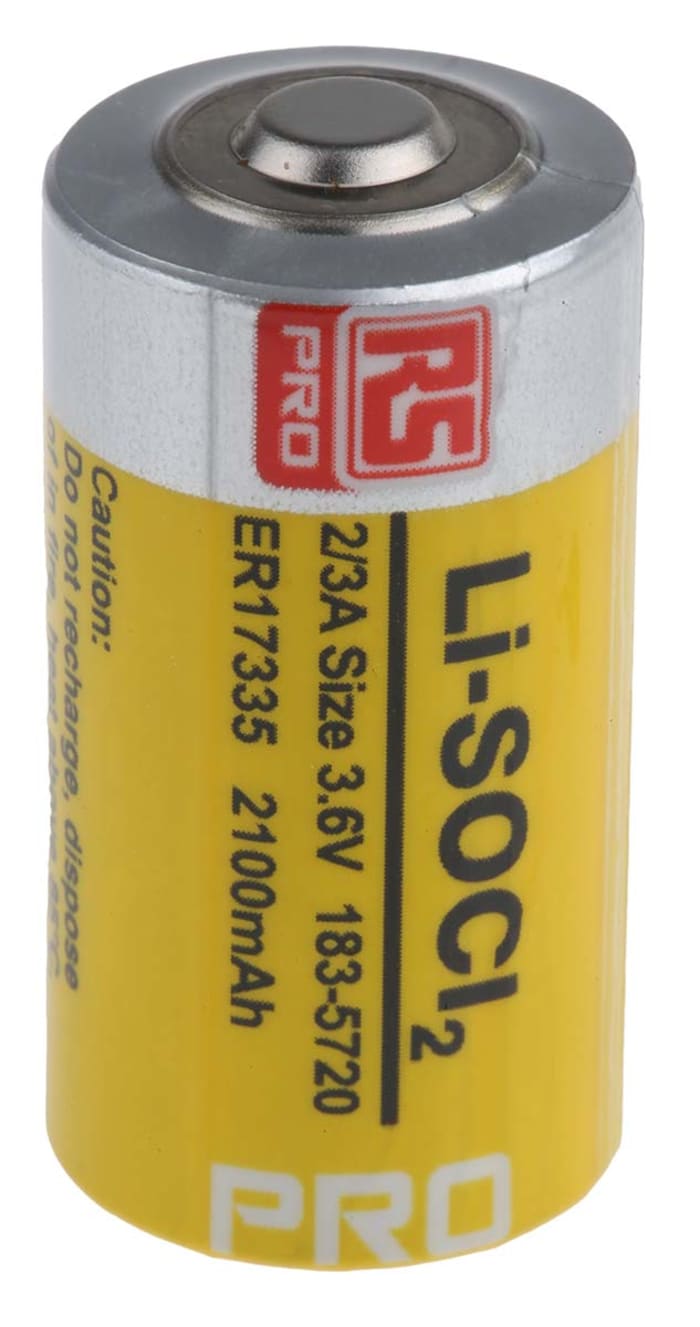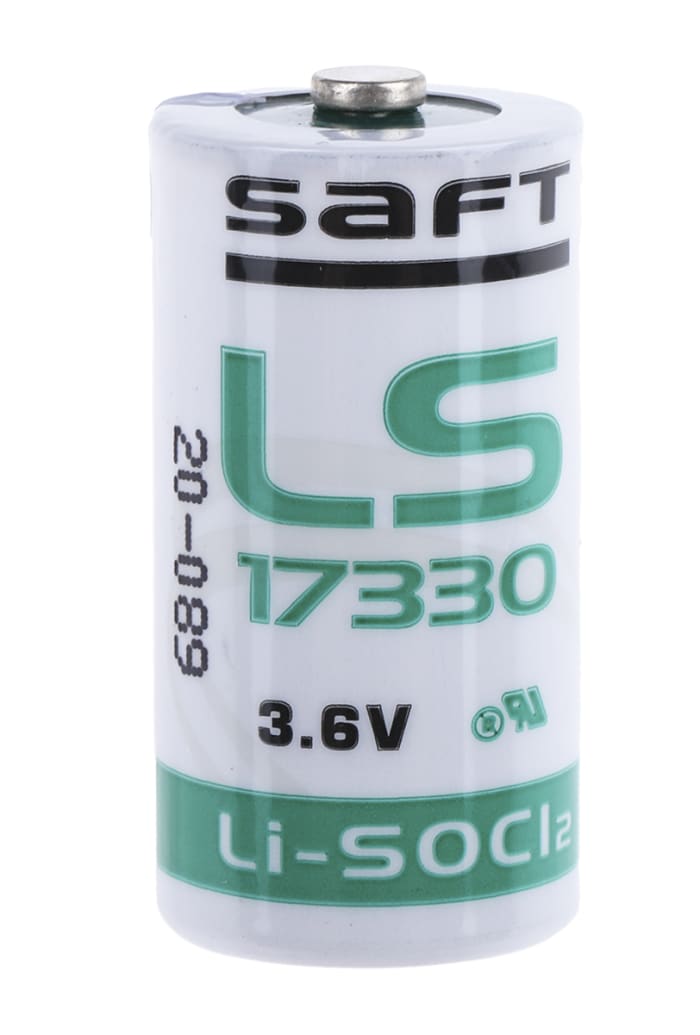RS PRO Lithium Thionyl Chloride 3.6V, 2/3 A Battery

Technical documents
Specifications
Brand
RS ProSize
2/3 A
Nominal Voltage
3.6V
Chemistry
Lithium Thionyl Chloride
Capacity
2.1Ah
Terminal Type
Standard
Dimensions
16.3 x 33.1mm
Product details
RS PRO Pipped Lithium Thionyl Chloride Cells
RS PRO Lithium batteries designed for use in industrial and commercial applications. They are not like typical daily used batteries, they have a nominal voltage rating of 3.6 V designed for use in applications where a device is used for a long period of time such as utility metering, security and alarms.
RS PRO batteries use lithium-thionyl chloride so they have a high energy density, low discharge rate, ideal for lengthy storage periods plus they are fully compliant with IEC60086-4 safety standards.
Why choose these batteries?
• 3.6 V
• Compatible with equipment or instruments designed for this nominal voltage rating
• Non-rechargeable
• Superior resistance to atmospheric corrosion
Lithium batteries what are the advantages?
• Operating voltage: 3.6 V
• AA, 1/2 AA, C and D size available
• Low self-discharge for extended life
• Operating temperature: - 60°C to + 85°C
• Non-flammable
• Low magnetic signature
• Resistance to corrosion
• Hermetically sealed cell
Typical Applications:
Lithium batteries are used in electronic devices that require a small, compact source of power. Example applications include:
• Utility Meters
• Smoke detectors
• Alarm systems
FAQ’s
Are Lithium Batteries Harmful?
Lithium batteries can sometimes leak a substance called potassium hydroxide which is a caustic agent that can cause eye, skin and respiratory irritations. This risk is reduced by not mixing different manufacturer battery types, batteries of different chemistries and by the replacement of all batteries at the same time.
How to dispose of Alkaline/Lithium Batteries?
Recycle responsibly, a wide range of schemes are available.
Safety Advice
Keep out of sight and reach of children
Guidance:
• Always install the batteries correctly as per instruction
• Ensure that the contact points are clean and conductive
• Do not mix different types of battery
• Do not heat or attempt to recharge the battery
• Do not dispose of in a fire
Approvals
UL recognised component
Stock information temporarily unavailable.
P.O.A.
1
P.O.A.
Stock information temporarily unavailable.
1
Technical documents
Specifications
Brand
RS ProSize
2/3 A
Nominal Voltage
3.6V
Chemistry
Lithium Thionyl Chloride
Capacity
2.1Ah
Terminal Type
Standard
Dimensions
16.3 x 33.1mm
Product details
RS PRO Pipped Lithium Thionyl Chloride Cells
RS PRO Lithium batteries designed for use in industrial and commercial applications. They are not like typical daily used batteries, they have a nominal voltage rating of 3.6 V designed for use in applications where a device is used for a long period of time such as utility metering, security and alarms.
RS PRO batteries use lithium-thionyl chloride so they have a high energy density, low discharge rate, ideal for lengthy storage periods plus they are fully compliant with IEC60086-4 safety standards.
Why choose these batteries?
• 3.6 V
• Compatible with equipment or instruments designed for this nominal voltage rating
• Non-rechargeable
• Superior resistance to atmospheric corrosion
Lithium batteries what are the advantages?
• Operating voltage: 3.6 V
• AA, 1/2 AA, C and D size available
• Low self-discharge for extended life
• Operating temperature: - 60°C to + 85°C
• Non-flammable
• Low magnetic signature
• Resistance to corrosion
• Hermetically sealed cell
Typical Applications:
Lithium batteries are used in electronic devices that require a small, compact source of power. Example applications include:
• Utility Meters
• Smoke detectors
• Alarm systems
FAQ’s
Are Lithium Batteries Harmful?
Lithium batteries can sometimes leak a substance called potassium hydroxide which is a caustic agent that can cause eye, skin and respiratory irritations. This risk is reduced by not mixing different manufacturer battery types, batteries of different chemistries and by the replacement of all batteries at the same time.
How to dispose of Alkaline/Lithium Batteries?
Recycle responsibly, a wide range of schemes are available.
Safety Advice
Keep out of sight and reach of children
Guidance:
• Always install the batteries correctly as per instruction
• Ensure that the contact points are clean and conductive
• Do not mix different types of battery
• Do not heat or attempt to recharge the battery
• Do not dispose of in a fire
Approvals
UL recognised component

